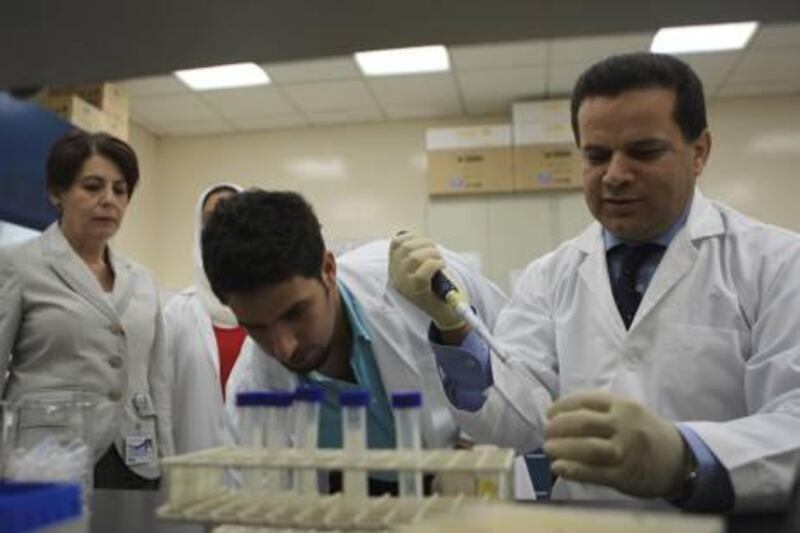ABU DHABI // A new in-vitro fertilisation centre in Abu Dhabi will offer genetic screenings of embryos - a service that geneticists say is needed to prevent disorders related to interfamily marriage.
Burjeel Hospital, to open early next year through Lifeline Hospital Group, plans to offer pre-implantation genetic diagnosis (PGD) in collaboration with the IVF Centre in University Hospital Brussels. The service is not yet widely available in the UAE.
The procedure, which is popular in Saudi Arabia, tests for genetic abnormalities before implanting the egg in the womb.
Because the screening occurs at an early stage, defective eggs can be discarded without contravening Islamic law, and the couple in question can try again for a healthy child.
PGD tests for genetic mutations when the embryo has grown to about eight cells.
By law, any excess fertilised eggs must be left to "expire" naturally.
Experts have been calling for the practice to be implemented widely in the UAE, where about 50 per cent of Emiratis engage in consanguinity, or a relationship by blood or common ancestor in marriage. They say that although some private clinics offer the service, it is not highly regulated and residents usually travel to Saudi Arabia, the United States and Europe for PGD services.
More than 270 genetic diseases have been reported in the UAE, and the Ministry of Health has named genetic disorders as one of the five most common causes of death in the country.
PGD "is a service that is long overdue in this country", said Dr Mahmoud Talib Al Ali, the director of the Centre for Arab Genomic Studies and head of the Dubai Health Authority's genetics unit. He said it had not been available because of a lack of expertise and technology, and not because of ethical concerns.
"We cannot prevent people from getting married or try to change the culture of a country. We can only expand genetic counselling programmes rather than use prenatal screenings to detect abnormalities, when it is too late and we cannot decide the fate of this child, only if it is affected or not affected."
Dr Bassam Ali, an associate professor of molecular and genetic medicine, said that although there were many advantages, such as the ability to screen for defects in multiple genes, the process can be costly.
Officials with Burjeel Hospital did not yet know the cost, but at Dubai Gynaecology and Fertility Centre, the process can cost more than Dh35,000.
Dr Lihadh Al Gazali, who has worked with Dr Ali at UAE University and a clinic at Tawam Hospital in Al Ain, has worked to put names to genetic disorders specific to families in the region.
Those disorders include symptoms such as blindness, painful and untreatable skin lesions, and an underdeveloped cerebellum, which is the region of the brain that controls movement.
She said premarital screenings of couples with a family history of genetic disease were not always effective, and has called for PGD as a preventive alternative.
While some religious leaders have denounced the practice as a form of terminating a pregnancy, Sheikh Musa Furber, a researcher and scholar of Islamic sciences with the Tabah Foundation in Abu Dhabi, argued that an embryo left alone would not lead to viable life. Not every fertilised embryo should have to be implanted, he said.
"There is a difference between trying to screen out for certain things and engaging in genetic engineering," he said.
"When you go to the grocery store and choose not to buy bruised or rotten vegetables, no one will argue that you are playing God."






